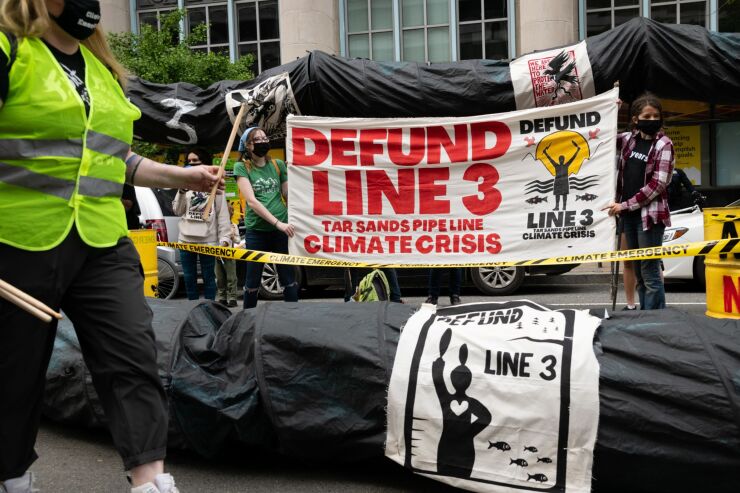
Progressive shareholder activists want some of the world's largest asset managers, including Goldman Sachs and JPMorgan Chase, to explain a recent decline in those firms' support for left-leaning environmental and social policies at public companies.
The shareholder groups, which are led by the nonprofit Interfaith Center on Corporate Responsibility, say that four big asset managers are demonstrating less support than they previously did for proposals that the progressive organizations favor.
Those proposals, which shareholders vote on at companies' annual meetings, include efforts to force expanded corporate reporting on greenhouse gas emissions and workforce diversity data.
Asset managers hold a great deal of sway over the results of shareholder proposals, since they cast votes for many smaller investors.
"Asset owners are increasingly concerned about asset managers' declining proxy voting on ESG shareholder proposals," the Interfaith Center on Corporate Responsibility said in a statement last week.
Asset managers are increasingly in the crosshairs of critics on both the left and right over environmental, social and governance matters.
Last week, House Republicans continued their effort to push back against ESG initiatives by issuing
The progressive shareholder groups, pushing in the opposite direction, have filed proposals for the 2024 proxy season at Goldman Sachs and JPMorgan, as well as at BlackRock and State Street. They are requesting that those firms' boards of directors initiate reviews of their voting records and policies.
In their proposals, the progressive groups argue that there is a "misalignment" between the asset managers' voting record this year and their public commitments to support environmental and social proposals.
In 2023, JPMorgan's asset management group voted in favor of 15 out of 65 climate resolutions, according to regulatory filings compiled by data provider Diligent.
Goldman Sachs voted for four out of 65 climate resolutions this year, the Presbyterian Church (U.S.A.) said in its proposal to the Wall Street investment bank, citing data from Diligent.
BlackRock's support for environmental proposals on proxy ballots fell from 37% in 2022 to 15% this year, while State Street's support declined from 50% to 37%, according to a report by Georgeson, a consulting firm that focuses on shareholder engagement issues.
"The resolutions challenge these asset managers' poor voting record and urge them to evaluate misalignments between their public commitments on climate and racial justice and their proxy voting record," the Interfaith Center on Corporate Responsibility said in its statement.
A BlackRock spokesperson declined to comment, except to say in an email that the company plans to engage with the shareholders that filed the proposal.
Spokespeople for Goldman Sachs and JPMorgan declined to comment. State Street did not respond to a request for comment.
At large U.S. banks,
At Bank of America, less than 7% of shareholders supported a timed phaseout of financing new oil and gas exploration and development, down from 11% for a similar proposal last year. The trend was similar at Citigroup, where shareholder support for a related proposal — aimed at combating climate change — dropped from 12.8% in 2022 to 9.9% this year.
Timothy Smith, a senior policy advisor at the Interfaith Center on Corporate Responsibility, called the declines in support for environmental and social measures "distressing."
He noted, though, that support for progressive proposals remains relatively high at certain large asset managers. For example, Northern Trust supported a majority of resolutions related to emissions reductions, though its voting record on those measures declined to 55% this year from 95% in 2022, Smith said in an interview.
"It's not like everybody in the investment world didn't like the resolutions this year and decided to vote no," he said.
Both asset managers and banks are caught in the middle over the consideration of ESG factors, as they also face "severe criticism" from conservative activists and lawmakers, Smith said.
"It's very important they also hear from investors and clients who want to support them while they're under attack, but at the same time call them to a higher level of leadership," Smith said.

Heidi Walsh, executive director of the Sustainable Investments Institute, offered one caveat about the recent drop in support for progressive shareholder proposals. She said that in many cases, proposals related to diversity, equity and inclusion were withdrawn after shareholders and asset managers reached agreements.
"Proxy season is not just about the votes, it's about the withdrawal agreements," Walsh said. "On the diversity front, there was a lot of agreement on disclosure of DEI data being a good thing."
Clifford Rossi, a former chief risk officer at Citigroup, said that declining support from asset managers for shareholder proposals related to climate and social issues is due in part to new regulations enacted in recent years, which loosened the rules for filing and holding proxy votes.
But he indicated that there could also be other factors.
"These filings are trying to get a better handle on understanding why there's been such a sudden change in course by these large asset managers," said Rossi, a professor at the University of Maryland School of Business and the founder of the consulting firm Chesapeake Risk Advisors.
He described asset managers as stuck in a position where any decision "will invite scrutiny from both sides."
As progressive groups have sought to advance ESG initiatives, lawmakers and politicians in some Republican-led states have
The kinds of information being sought by the progressive groups could also prove useful to their ideological adversaries on the right.
"We're certainly in favor of the idea that these companies should be more transparent about the grounds on which they're making these recommendations," said Scott Shepard, director of the conservative Free Enterprise Project. "We would be delighted to find that out."




